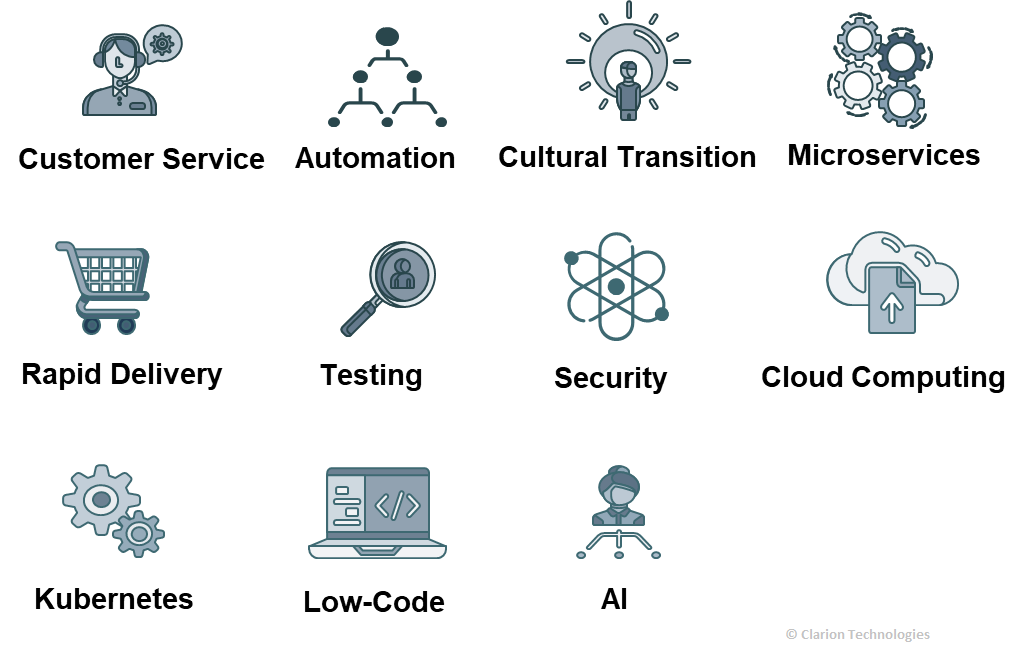DevOps helps businesses deliver applications and services at a high velocity. So, is that the reason why DevOps is evolving and improving conventional software development? SMBs can provide better customer service and engage in more profitable market competition. A study by IDC predicts that the DevOps market will reach $8 billion by 2022.
DevOps accelerates the development process by overcoming the issues organizations face with access management and workflow. DevOps has blossomed as businesses want to hire DevOps engineers. A good DevOps strategy helps not only big companies but SMBs as well.
Here are some latest DevOps trends that Clarions tech experts think will change the game for SMBs.
1. Powerup with Customer Centric Service
In today's cutthroat business environment, the customer is king. Customers are more likely to switch to other services with delays in responding to their feedback. Over time, this affects your business.
You can solve this problem with DevOps. Design a well-integrated and regular feedback loop approach. This enables you to release upgrades, adjust, or bounce back from failures without ruining the client experience.
2. Automation – Unleash a Secret Weapon
DevOps automation will help you improve efficiency, accuracy, consistency, reliability, and delivery. With DevOps automation, you can watch out for all phases of development, including creating, delivering, and monitoring.
- Provisioning
It can take a while to provision and deploy changes; each component needs scrutiny at a high level.
- Deployment
IT teams can offer faster resources and facilitate quick proofs of concept, development, testing, and deployment with API-centric design and automation.
3. Focus on Cultural Transition
Developers can introduce new innovative procedures with a DevOps approach to focus on culture. DevOps is more than a new set of tools. It's a cultural revolution promoting communication, collaboration, integration, and automation. This transformation doesn't occur instantly or automatically; it takes thoughtful activities and decisions.
4. Ace Your Game with Microservices
The application can include several microservices architecture services (inventory management service, payment service, shopping cart service). You can independently create and deploy them. It isolates issues and lessens the impact on apps.
For Microservices-based systems, the DevOps strategy is appropriate because it makes development simple, offers seamless updates, and controls each service without running the risk of an entire program failing.
5. Fast-forward Your Production Process with Rapid Delivery
Maximize release frequency and speed to enhance your product more quickly. Releasing new features and fixing bugs will help you to respond to client requests and gain a competitive edge. Practices like continuous integration and delivery automate the entire software release cycle, from development through deployment.
6. Root out those Bugs and Get Started with Testing
After Agile began to gain popularity, software testing underwent significant evolution. In the DevOps for testers paradigm, software testing necessitates an automated test procedure with feedback at each stage.
Developers must prioritize automated test development in areas of complexity. Before automating, you are finding and fixing any early flaws in new code may be beneficial. No matter your automation technique, it's a good idea to maintain version control for your test scripts.
7. Shut-down Loopholes and Strengthen Security
The goal of DevSecOps is to close the gap between DevOps and Security. They are accountable for the security of their apps in the same ways as individuals or groups are responsible for their development and operations. All stakeholders in the DevOps value chain have responsibility for security in DevSecOps. In DevSecOps, development, release management (or operations), and security teams work together continuously and flexibly. DevSecOps assists in sustaining velocity without compromising security. DevOps, in other words, focuses on speed.
8. Speedup Delivery with Cloud Computing
Cloud and DevOps go hand in hand. Most cloud development projects use DevOps, and the number will continue to grow. DevOps for cloud projects have advantages that are also becoming clear. They include user demands that quickly integrate into the program, application development speed-to-delivery to meet the needs of the business units faster, and lower costs for development, testing, deployment, and operations.
9. Resolve All Issues with Kubernetes to Your Rescue
How can Kubernetes benefit DevOps? It makes it possible for engineers to communicate their dependencies to IT operations. Workload reduction is one of the main benefits of adopting Kubernetes for DevOps. Additionally, it resolves inconsistencies across several environments. It enables engineers to meet client demands while relying on the cloud DevOps for many operational apps.
Kubernetes makes container tasks easier. It simplifies tasks like horizontal auto-scaling, rolling upgrades, and canary deployment. It is crucial in optimizing the DevOps Managed Services' pipelines for development, testing, and deployment.
10. Harness Your Capabilities With Low code
Using Low-code platforms help extend the benefits of DevOps and agile. DevOps and low-code platforms have become standard for crucial enterprise initiatives. DevOps use low-code platforms for iteration, continuous improvement, and continuous delivery, where low-code is making an impact.
11. Enhance Your Process & Software Development with AI
AI increases DevOps productivity and improves performance with rapid development. It provides an engaging user experience. DevOps is a business-driven method for delivering software, and AI technology helps it integrate into the system for improved functioning; they are mutually dependent.
You can check our azure devops case study – Here’s an example of how our DevOps engineers helped a leading finance firm speed up time to market.
Also check out our blog on DevOps is the right fit for your organization?

Conclusion
Our DevOps engineers at Clarion have expertise in transitioning your delivery solutions to the Cloud. We have ample experience in containerized environment management and source code management. Our DevOps engineers use automation platforms and the latest tools for faster and hindrance-free deployment.
Using tools like AWS, azure devops resource manager, and google cloud deployment manager we help define and manage dependent resources for your app development. You can reach our team at info@clariontech.com and get all your projects back on track with our 2-week risk-free trial. Contact us for any queries regarding software development and services.



